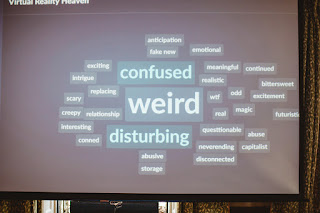Step 6: Never work with children or animals
It’s an oft-repeated phrase in our industry: never work with children or animals! Animals are so unpredictable! You can rehearse all you like but when the camera’s rolling, you never really know what they’re going to do. And children?
One of the motivations for involving children within the project was a shared belief that their voices would be key to shaping the future of both VR and Quantum technologies - they are the researchers and developers of the future. For us, the involvement of children was not about simply crowdsourcing ideas from them. Instead, it was about recognising how much we can learn from them. We can understand how a new generation makes sense of the world, their fears, anxieties, and hopes. And through the process of engaging them, attempt to facilitate their voices with a platform (i.e. that of the university and by changing perspectives using the Kilter productions) from which those developing VR technology and content can hear.
It is now considered part of Kilter’s best-practise to spend a good proportion of any research time with young people... but that’s not to say it’s always easy.
With Kilter we spend a lot of time thinking about the future. We imagine what it’ll be like if VR headsets become as discreet & commonplace as mobile phones; we create scenarios where quantum weaponry has got into the wrong hands. We throw about dates - 10, 20, 50, 100 years into the future.
With each passing year, it becomes increasingly difficult to imagine ourselves in the worlds we anticipate. When we first set up a ‘Washing Line of Time’ across a workshop room & tried to peg scenarios along it stretching into the future, it was 2005. We imagined we might be around to see things unfolding until 2058, perhaps a little longer if we were lucky. Last term at a school in Bristol we worked with young people in Years 9 & 10 who had a very reasonable chance of celebrating their 100th birthdays in 2105. Their’s is the future to inherit. It’d be silly not to have them in the room.
Inventing sci-fi with kids is fun. They take to it like a ducks to water. There is usually a good number in the room that imagine everything will be robots & outer space practically before they’ve finished their GCSEs. Others are more nuanced; more realistic.
Ethics is a trickier thing to manage. Young people with relatively few responsibilities can be quite blithe about money, politics, violence & even death… & in many ways they are quite right to be; they are adult concerns.
However, ethics abound in young people’s lives - more so now that ever before. In a University setting, Kilter even has to submit to an ethics committee to work with young people in the first place. “What are we doing?” “Why are we doing it?” “What are the risks?”
Every day of their lives children are asked a continual cycle of questions about what is OK so they know instinctively that there are grey areas. Even in a workshop in a classroom at school we find ourselves asking “Do you mind if we take your picture to keep a record of this workshop?” “Do you mind if I touch your head whilst I help you put on this headset?” “Do you mind if I share your ideas & opinions in a play we are developing.”
It’s great that these kinds of safeguards are in place but sometime the thoroughness of the ‘working with children’ process can feel quite strangling. There are extra levels of paperwork for a start. Then there are ‘observers’ in the room &, even if they are a familiar science teacher or a foreign but friendly face, the children are always aware that their presence means something - something is at risk.
For us the risk is that the students won’t feel comfortable to open up & share their ideas & what’s on their minds. That’s deadly for this kind of process as the whole point is open, honest, imaginative playfulness. We want a room where everybody feels free to make mistakes & say bold, stupid things without their friends laughing and without the person in the corner bowing their head to make a note. That's why we always insist that everybody joins in, even the reticent adult observer or lab technician, the shy kids, the arty ones, the science scholars... In a room that is comfortable & safe there are no wrong answers. Playfulness can't be done wrong. Creativity is happy mistakes.
Kilter has done this before - in almost every show we’ve ever made we’ve had a period of public consultation. Since 2007’s Roots we have included direct quotes from workshop participants in our final scripts & the footage we have of people hearing the actor quote their own words is testimony to the impact that can have. It’s empowering whether you see the play or just know you have contributed. It gives you a validity & a voice whether you wish to be credited or remain anonymous.
So we will continue to work with children. We will bear the fact that their are hoops to jump through. We will tolerate the wild nonsense that some young people insist on. Like an animal performing on set, we will give them as long a lead as they need & hope that they trust us enough not to turn ugly & bite us.


Comments
Post a Comment